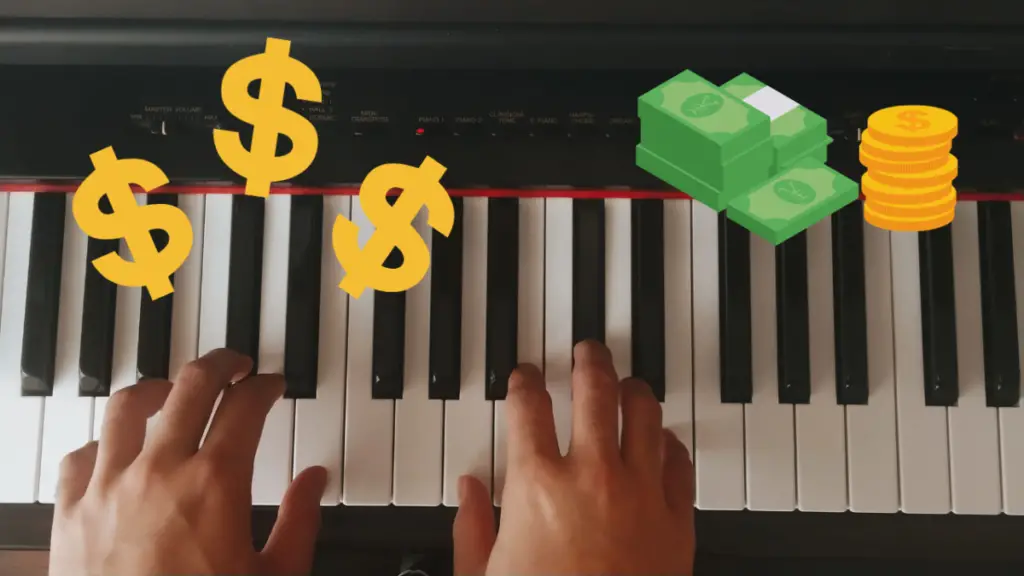This post contains affiliate links.
It’s not uncommon to see famous musicians insure their most important body parts as they are needed to play the instruments. What about pianists? Do pianists insure their most valuable assets – the hands?
Famous pianists like Lang Lang get hand insurance so they still have an income if something unfortunate happens to their hands and they can no longer play the piano. Hand insurance is expensive, isn’t available to the general public and is offered by only a few insurance providers.

Continue reading to see how much Lang Lang’s hands are insured for, why pianists insure their hands and how you can get hand insurance if you wish to do so.
Finally, I’ll discuss how to take care of your precious hands for playing the piano, so that you will never need to rely on insurance money for income.
Do pianists insure their hands?
Many famous pianists insure their hands:
- Lang Lang insures his hands. He even went the extra mile and don’t deal with any cooking. This is to avoid accidentally getting cut by a knife. Sources are claiming that Lang Lang’s hands are insured for at least USD 10 million.
- Liberace (1919 – 1987) was a pianist and actor. He was known for his flamboyance and was at one point the highest-paid entertainer in the world. Since he was making so much money, it makes sense why he needed to get hand insurance.
- Richard Clayderman is a French pianist that has written many compositions and also has his hands insured.
Why do pianists insure their hands?
The reason why a person would get hand insurance or body-part insurance, in general, is to still have a source of income if their body part – which is used to generate income – is injured or lost.
Imagine if something bad happens to a concert pianist’s hands and they can’t play the piano anymore, they will lose their livelihood as playing the piano is their main source of income. This is why hand insurance is important for a pianist as it creates a safety net for them to fall back on.

How to get hand insurance for a pianist?
Normal insurance providers don’t offer hand insurance because hand insurance is highly personalized and only targets a small percentage of the population (i.e famous pianists or celebrities)
With that said, if you have a lot of money on hand (pun intended), you can have your hands insured with certain insurance providers like Lloyd’s of London. Their customers range from famous musicians like the Rolling Stones guitarist Keith Richard to famous actors or athletes.
However, because hand insurance is created from scratch and is tailored to the person’s needs, the premium (what you pay to the insurance provider) is sky-high. This is why average Joes like you and I won’t be able to afford hand insurance.
Not to mention to receive benefits from hand insurance, you would need to lose your hands completely. Illness like tendonitis or arthritis affecting your hands won’t make you eligible to receive benefits.
What we can afford instead is disability income insurance (DI) which is cheaper and better suits the general public:
Why disability income insurance is better as an option:
Disability income insurance provides income to those that can’t work because of a disability. This disability can be caused by an accident or an illness. So let’s say if a pianist gets tendonitis or arthritis and can’t play the piano anymore, they are eligible to receive benefits from the insurance policy.
DI insurance is offered by employers, Social Security or private insurance providers.
If eligible, DI can pay you at least half of your normal gross income. DI costs anywhere from 1-3% of your gross income.
Premium (what you pay) depends on your age, job, and income. If your job is dangerous, your premium will be higher. If you earn a lot of money, your premium will be high.
You can read more about DI insurance here and be sure to contact the insurance provider for more details as different providers offer different benefits and policies.
How to take care of your hands for playing the piano?
While having insurance money to fall back on in case anything hairy happens to your precious hands is nice, no pianist would ever want to one day rely on it.
This is because if something unfortunate happens to their hands and they can’t play the piano anymore, not only do they lose their main source of income but also their purpose in life as they have been honing their skills at the piano for years and suddenly those skills become useless.
While we can’t control what happens in the world around us, we can at least take good care of our hands and make sure they are always in tip-top shape. Here are a few tips for taking care of your hands:
Keep your body relaxed when playing the piano
This is to prevent tensions from building up in your hands or shoulders that can cause cramps.
Make sure to take deep breaths to relax, don’t tense your shoulders and keep your fingers loose by shaking them or dunking them into warm water to promote blood circulation.
Moisturize your hands in the winter
The weather is always dry and cold in the weather which can cause painful cracks to form on your hands. This can affect your piano playing be sure to moisturize your hands and keep them warm by wearing gloves.

Keep your fingers curved
Playing the piano with proper forms is the best way to avoid injuries. Aside from the correct sitting posture, curving your fingers makes playing the piano easier and prevents potential injuries.
To know how much you should curve your fingers, imagine holding a tennis ball in your hands – that’s the position your fingers should be in when playing the piano.
Stretch your hands before and after practice
Like a jogger warming up or winding down after a jog, we pianists also stretch our hands to prepare them for practicing the piano and to avoid injuries.
For what hand-stretching exercises to do, check out this video that I use to stretch my own hands before and after practicing. So far I have no injuries and I find that my hands are more flexible after stretching them:
Keep your nails short
You want to keep your nails short and always have your fingertips touch the piano keys as doing this will give your a better grip on the keys. This is why many piano players cut their nails before a piano recital or practical exam.
Play the piano using the weights of your arms
Instead of just using your wrists and fingers to press down the keys, also use the weights of your arms and gravity to assist.
This is to not put too much stress on the wrists and fingers and to evenly distribute the work between the different parts of the arm.
You can also play the piano louder by using the weights of your arms.

